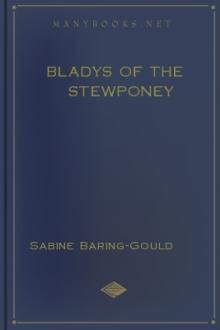The Broom-Squire, Sabine Baring-Gould [books to read this summer txt] 📗

- Author: Sabine Baring-Gould
Book online «The Broom-Squire, Sabine Baring-Gould [books to read this summer txt] 📗». Author Sabine Baring-Gould
Accordingly she was resolved, if possible, to remove the girl from the Ship before the arrival of Iver. The proposal of the Broom-Squire was opportune, and she was anxious to forward his suit as the best means for raising an insuperable barrier between her son and the girl, as well as removing her from Simon, who, with his characteristic wrong-headedness, might actually do what he had proposed.
"I don't see what you're crying about," said Mrs. Verstage, testily. "It ain't no matter to you whether Iver takes Polly Colpus or a Royal Princess."
"I don't want him to be worried, mother, when he comes home with having ugly girls rammed down his throat. If you begin that with him he'll be off again."
"Oh! you know that, do you?"
"I am sure of it."
"I know what this means!" exclaimed the angry woman, losing all command over her tongue. "It means, in plain English, just this--'I'm going to try, by hook or by crook, to get Iver for myself.' That's what you're driving at, hussy! But I'll put you by the shoulders out of the door, or ever Iver comes, that you may be at none of them tricks. Do you think that because he baptized you, that he'll also marry you?"
Mehetabel sprang through the door with a cry of pain, of wounded pride, of resentment at the injustice wherewith she was treated, of love in recoil, and almost ran against the Broom-Squire. Almost without power to think, certainly without power to judge, fevered with passion to be away out of a house where she was so misjudged, she gasped, "Bideabout! will you have me now--even now. Mother turns me out of doors."
"Have you? To be sure I will," said Jonas; then with a laugh out of the side of his mouth, he added in an undertone, "Don't seem to want that I should set a net; she runs right into my hands. Wimen is wimen!"
CHAPTER XI.
A SURNAME AT LAST.
When Simon Verstage learned that Mehetabel was to be married to the Broom-Squire, he was not lightly troubled. He loved the girl more dearly than he was himself aware. He was accustomed to see her about the house, to hear her cheerful voice, and to be welcomed with a pleasant smile when he returned from the fields. There was constitutional ungraciousness in his wife. She considered it lowering to her dignity, or unnecessary, to put on an amiable face, and testify to him pleasure at his presence. Little courtesies are dear to the hearts of the most rugged men; Simon received them from Mehetabel, and valued them all the more because withheld from him by his wife. The girl had known how to soothe him when ruffled, she had forestalled many of his little requirements, and had exercised a moderating influence in the house. Mrs. Verstage, in her rough, imperious fashion, had not humored him, and many a domestic storm was allayed by the tact of Mehetabel.
Simon had never been demonstrative in his affection, and it was only now, when he was about to lose her, that he became aware how dear she was to his old heart. But what could he do, now that she had given herself to Jonas Kink? Of the manner in which this had been brought about he knew nothing. Had he been told he would have stormed, and insisted on the engagement coming to an end. But would this have mended matters? Would it not have made Mehetabel's position in the house only more insupportable?
He remained silent and depressed for a week, and when the girl was in the room followed her with his eyes, with a kindly, regretful light in them. When she passed near him, he held out his hand, took hers, squeezed it, and said, "Matabel, we shall miss you:--wun'erful--wun'erful!"
"Dear father!" she would answer, and return the pressure of his hand, whilst her eyes filled.
"I hope you'll be happy," he would say; then add, "I suppose you will. Mother says so, and wimen knows about them sort o' things better nor we."
To his wife Simon said, "Spare nothing. Give her a good outfit, just as if she was our own daughter. She has been a faithful child, and has saved us the expense and worrit of a servant, and I will not have it said--but hang it! what odds to me what is said? I will not have her feel that we begrudge her aught. She has no father and mother other than we, and we must be to her all that we can."
"Leave that to me," said the wife.
Mainly through the instrumentality of Mrs. Verstage the marriage was hastened on; it was to be as soon as the banns had been called thrice.
"Wot's the good o' waitin'?" asked Mrs. Verstage, "where all is pleasant all round, and all agreed?"
Mehetabel was indifferent, even disposed to have the wedding speedily, there was no advantage in postponing the inevitable. If she were not wanted in the Ship, her presence was desired in the Punch-Bowl, if not by all the squatters there, at all events by the one most concerned.
She felt oppression in the house in which she had been at home from infancy, and was even conscious that her adopted mother was impatient to be rid of her. Mehetabel was proud, too proud to withdraw from her engagement, to acknowledge that she had rushed into it without consideration, and had accepted a man whom she did not love. Too proud, in fine, to continue one day longer than need be, eating the bread of charity.
Seamstresses were summoned, and every preparation made that Mehetabel should have abundance of clothing when she left the Ship.
"Look here, Susanna," said Simon, "you'll have made a pocket in them gownds, you mind."
"Yes, Simon, of course."
"Becos I means to put a little purse in for Matabel when she goes from us--somethin' to be her own. I won't have the little wench think we han't provided for her."
"How much?" asked Mrs. Verstage, jealously.
"That I'm just about considerin'," answered the old man cautiously.
"Don't you do nothin' reckless and unraysonable, Simon. What will she want wi' money? Hasn't she got the Broom-Squire to pay for all and everything?"
During the three weeks that intervened between the precipitate and ill-considered engagement and the marriage, Mehetabel hardly came to her senses. Sometimes when occupied with her work in the house a qualm of horror came over her and curdled the blood in her heart; then with a cold sweat suffusing her brow, and with pale lips, she sank on a stool, held her head between her palms, and fought with the thoughts that rose like spectres, and with the despair that rolled in on her soul like a dark and icy tide. The words spoken by the hostess had made it impossible for her to retrace her steps. She could not understand what had come over Mrs. Verstage to induce her to address her as she had. The after conduct of the hostess was such as showed her that although wishing her well she wished her away, and that though having a kindly feeling towards her, she would not admit a renewal of former relations. They might continue friends, but only on condition of being friends at a distance. Mehetabel racked her brain to find in what manner she had given offence to the old woman, and could find none. She was thrust from the only bosom to which she had clung from infancy, without a reason that she could discover. Meanwhile she drew no nearer to Bideabout. He was delighted at his success, and laid aside for a while his bitterness of speech. But she did not admit him to nearer intimacy. His attempts at familiarity met with a chilling reception; the girl had to exercise self-restraint to prevent the repugnance with which she received his addresses from becoming obvious to him and others.
Happily for her peace of mind, he was a good deal away, engaged in getting his house into order. It needed clearing out, cleansing and repairing. No money had been expended on dilapidations, very little soap and water on purification, since his mother's death.
His sister, Mrs. Rocliffe, some years older than himself, living but a few yards distant, had done for him what was absolutely necessary, and what he had been unable to do for himself; but her interest had naturally been in her own house, not in his.
Now that he announced to her that he was about to marry, Sarah Rocliffe was angry. She had made up her mind that Jonas would continue a "hudger," and that his house and land would fall to her son, after his demise. This was perhaps an unreasonable expectation, especially as her own conduct had precipitated the engagement; but it was natural. She partook of the surly disposition of her brother. She could not exist without somebody or something to fall out with, to scold, to find fault with. Her incessant recrimination had at length aroused in Jonas the resolve to cast her wholly from his dwelling, to have a wife of his own, and to be independent of her service.
Sarah Rocliffe ascertained that she had overstepped the mark in quarrelling with her brother, but instead of blaming herself she turned the fault on the head of the inoffensive girl who was to supplant her. She resolved not to welcome her sister-in-law with even a semblance of cordiality.
Nor were the other colonists of the Bowl favorably disposed. It was a tradition among them that they should inter-marry. This rule had once been broken through with disastrous results. The story shall be told presently.
The squatter families of the Punch-Bowl hung together, and when Sarah Rocliffe took it in dudgeon that her brother was going to marry, then the entire colony of Rocliffes, Boxalls, Nashes, and Snellings adopted her view of the case, and resented the engagement as though it were a slight cast on them.
As if the Bowl could not have provided him with a mate meet for him! Were there no good wenches to be found there, that he must go over the lips to look for a wife? The girls within the Bowl, thanks be, had all surnames and kindred. Matabel had neither.
It was not long before Bideabout saw that his engagement to Mehetabel was viewed with disfavor by him immediate neighbors, but he was not the man to concern himself about their opinions. He threw about his jibes, which did not tend to make things better. The boys in the Bowl had concocted a jingle which they sang under his window, or cast at him from behind a hedge, and then ran away lest he should fall on them with a stick. This was their rhyme:--
"A harnet lived in an 'ollow tree,
A proper spiteful twoad were he.
And he said as married and 'appy he'd be;
But all folks jeered and laughed he-he!"
Mehetabel's cheeks were pale, and her brows were contracted and her lips set as she went to Thursley Church on the wedding-day, accompanied by Mrs. Verstage and some village friends.
Gladly would she have elected to have her marriage performed as quietly as possible, and





Comments (0)